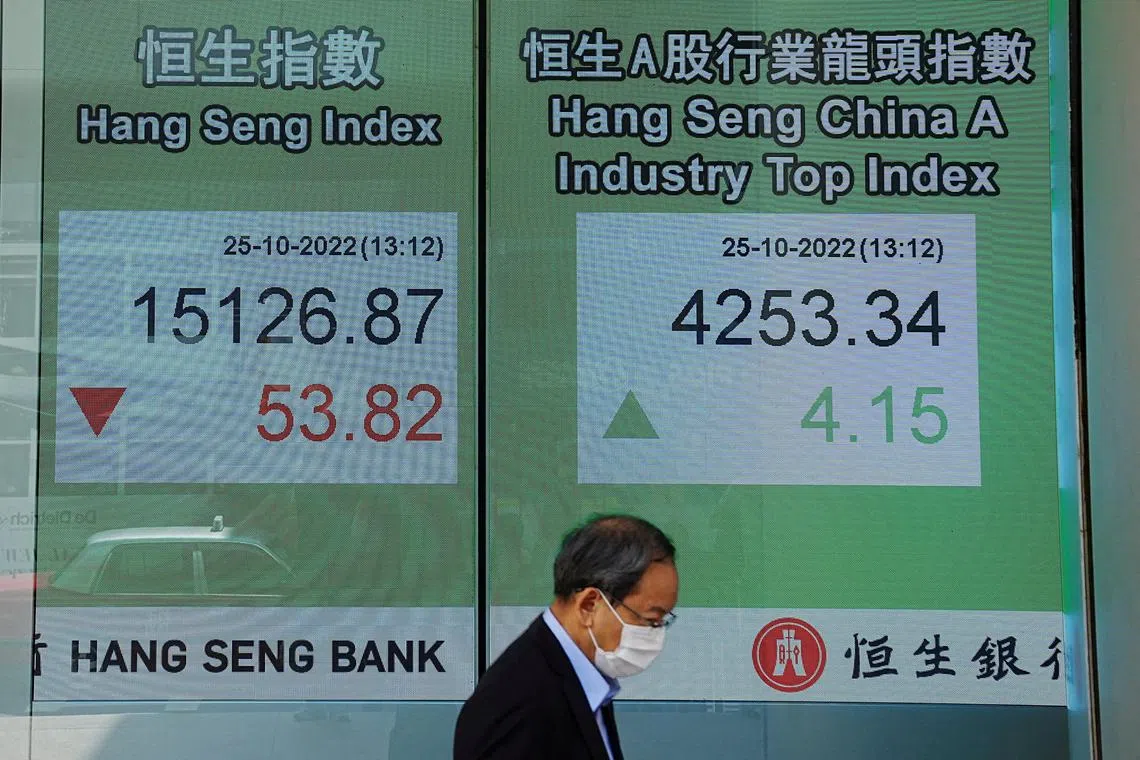China takes next step in currency globalisation, with some HK stocks to be priced in renminbi
Sign up now: Get ST's newsletters delivered to your inbox

Alibaba and Tencent are among the 24 stocks which will be priced and traded in both renminbi and the Hong Kong dollar.
PHOTO: REUTERS
Follow topic:
SHANGHAI/HONG KONG - China’s gradual internationalisation of its currency will shift to its next leg on Monday, when about two dozen Chinese companies start trading in their home currency in Hong Kong’s stock market.
Hong Kong stocks such as Alibaba and Tencent are among the 24 counters which will be priced and traded in both renminbi and the Hong Kong dollar under the Dual Counter Model on the Hong Kong stock exchange from Monday.
The scheme is targeting overseas investors with renminbi holdings initially, but will later include mainland investors via the Hong Kong-China Stock Connect link-up.
Offshore renminbi deposits in Hong Kong alone are estimated at 833 billion yuan (S$156 billion).
Fund managers say the step reflects Beijing’s desire to expand the use of renminbi outside China and provide another avenue for renminbi-denominated investment, thus reducing the risk of capital outflows chasing higher yielding currencies such as the United States dollar.
“China is pushing renminbi internationalisation to avert geopolitical risks and reduce reliance on the dollar, and for that purpose, you need wider use of the Chinese currency,” according to Dr Ding Wenjie, strategist of global capital investment at China Asset Management Co (ChinaAMC).
Dr Ding said the scheme is a major milestone and expects the model to be expanded in future, beyond stocks to bonds and even alternative assets, boosting overseas asset pools denominated in renminbi.
The initiative comes amid a steady stream of bilateral renminbi-denominated deals China has struck with trading partners, from Chinese oil purchases in the Middle East to commodities trade with partners from Brazil to Russia.
Beijing has retained close ties with Moscow despite the latter’s invasion of Ukraine.
The US dollar remains the dominant global currency, accounting for 42 per cent of global payments.
The renminbi’s share is just 2.29 per cent, but is up from 1.95 per cent two years ago.
A significant breakthrough in China’s efforts to promote use of the renminbi came in June, when Pakistan paid for its first government-to-government import of discounted Russian crude oil in the Chinese currency.
“When a currency is internationalised, it’s not only used in trade, physical goods, or services. It also has to be parked in investment vehicles,” said Pictet Wealth Management head of Asia macroeconomic research Chen Dong.
For foreign investors with renminbi holdings, “buying shares in Hong Kong without really going into mainland China will be a much, much easier way to park your holdings of this currency”, he said.
Under the dual counter arrangement, investors can choose to trade a stock either using Hong Kong dollars via the HKD counter, or renminbi via the RMB counter, with market makers providing liquidity and minimising price discrepancies.
Most of the first batch of stocks eligible for renminbi trading – which include AIA Group, Sun Hung Kai Properties and Hang Seng Bank – are not listed in China.
Fund managers expect a lukewarm interest in the renminbi counters initially, given near-term risks including a weakening renminbi and wobbly stocks as China’s economy struggles.
But they expect demand to pick up over time.
“Mainland investors, including mutual fund companies like us, have genuine incentives to trade Hong Kong stocks in renminbi,” said ChinaAMC’s Dr Ding.
“Our fund returns and dividends are priced in renminbi, so using the RMB counter can remove forex exchange costs, and shield us from currency volatility.”
There are many other reasons to trade in renminbi, said Mr David Friedland, Asia-Pacific managing director at Interactive Brokers, which offers renminbi-trading services. “There’s a lot of political uncertainty these days, so you may want to hold renminbi rather than US dollars, or the Hong Kong dollar, which is pegged to the US dollar.” REUTERS

